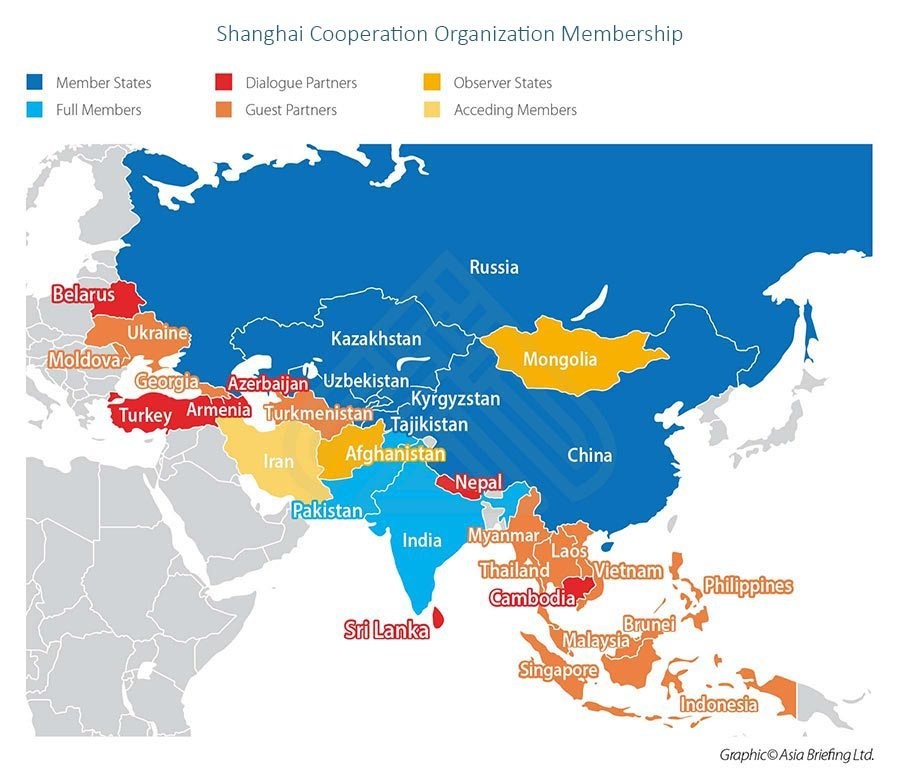Belt & Road Initiative Military Strength On Display As Russian, Chinese, Indian & Central Asian Armies March At Moscow’s Red Square
Event ignored by the West carries huge Eurasian geo-political significance
Op/Ed By Chris Devonshire-Ellis
The Russian, Chinese and Indian Military and Governments have thrown a statement of intent to the West in parading soldiers on Red Square yesterday, being the delayed Victory Parade concerning the defeat of Nazi Germany and the end of WWII in 1945. This year is the 75th anniversary of that occasion. The event took place following delays to the intended May 9 celebrations due to the Covid-19 pandemic.
There was immense symbolism at the Victory Day celebrations which most Western nations chose largely to ignore. At the time of WWII the allied powers united the USA, Great Britain, Russia, India (then under British colonial rule) and China among others. Defeating Nazi Germany took about 27 million Russian lives, and the Chinese an estimated 15 million. Indians fighting under the British Empire lost about 1.6 million nationals including 87,000 Indian soldiers. British soldiers lost in the war amounted to an estimated 67,000 and Americans about 291,000.
The British Government declined to send any high ranking officials to this years event. The United States sent its Ambassador to Moscow, where the parade took place, as did the Czech Republic, Egypt, France and Germany.
Visiting from overseas in person were the Chinese and Indian Governments, who both sent their Defence Ministers, as did the Governments of Algeria, Armenia, Azerbaijan, Indonesia, and Turkmenistan. Foreign Ministers and Presidents attended from Belarus, Bosnia & Herzegovina, Hungary, Kazakhstan, Kyrgyzstan, Moldova, Serbia, Tajikistan, Uzbekistan and Venezuela. The Mongolian Army also sent a military detachment.
The military parade from the participating countries yesterday can be viewed below.
The ceremony, while largely ignored by Western Governments and media has significance as it draws a line along a deepening fracture between East and West. Especially worrying is the lack of attention and respect paid by European countries in particular towards the appalling atrocities in WWII, apparently preferring to pay attention to more recent populist factions such as Black Lives Matter and other short lived fads. Equally apparent is the developing dynamic between Russia, China, and India in choosing to have their military marching together at the same commemoration. Increasingly the lives lost in the East are becoming more prominent in regional historical importance than the long held view that Britain and the United States ‘won the war’. A different mindset is now emerging, and with some resentment at seven decades of perceived Western propaganda of who was responsible and who suffered the most.
Meanwhile, it is noticeable that the attending countries are developing strong relationships with each other through institutions such as the Shanghai Cooperation Organisation. A dynamic concerning the SCO influence can be seen as follows.

Of the nations who participated in yesterdays military parades in Red Square, all, with the exception of India, are official Belt & Road Initiative members. Concerning India, although it has not officially endorsed the scheme, in actual fact it is part of the project and has developed as a major Asian interconnected Belt & Road Hub.
The marching of Indian military in Moscow’s Red Square yesterday, just after five other national divisions following the Chinese military can be seen as warning to the United States and the West over the potential for future alliances should Washington, and to some extent the EU continue their strategic differences of opinion with China and Russia, including the on-going rows concerning sanctions and threats of trade wars. Those include countries that India and China have important strategic geographical and trade relations with, including Russia itself as well as countries important to China and India, such as Turkey, Iran and Myanmar.
India’s participation in particular indicates that New Delhi views China and Russia as longer term strategic partners. Interference with that can now be seen to have geopolitical consequences. While there have been very recent disagreements and border clashes between India and China, India’s Defense Minister was also scheduled to have discussions with his Pakistani and Chinese counterparts in meetings brokered by Moscow during the celebrations. It is significant that Moscow is now the site for these peace-broker discussions, and not Washington.
In terms of intent, the inherent message from Moscow, New Delhi and Beijing, along with much of the Shanghai Cooperation Organisation members as concerns a pivot away from the United States and Europe cannot have been made in greater clarity. The regional geopolitical alliances are changing, with Moscow, Beijing and New Delhi now coming to the fore at the expense of London, Brussels and Washington. What happened yesterday in Red Square is evident proof of these changing dynamics.
Related Reading
- After Trump, Putin and Xi – How the New World Trade Order Will Look in 2030
- India and Russia To Connect Supply Chains Via Iran’s INSTC
About Us
Silk Road Briefing is written by Dezan Shira & Associates. The firm has 28 offices throughout Asia, and assists foreign investors into the region. For strategic advisory and business intelligence issues please contact the firm at silkroad@dezshira.com or visit www.dezshira.com





